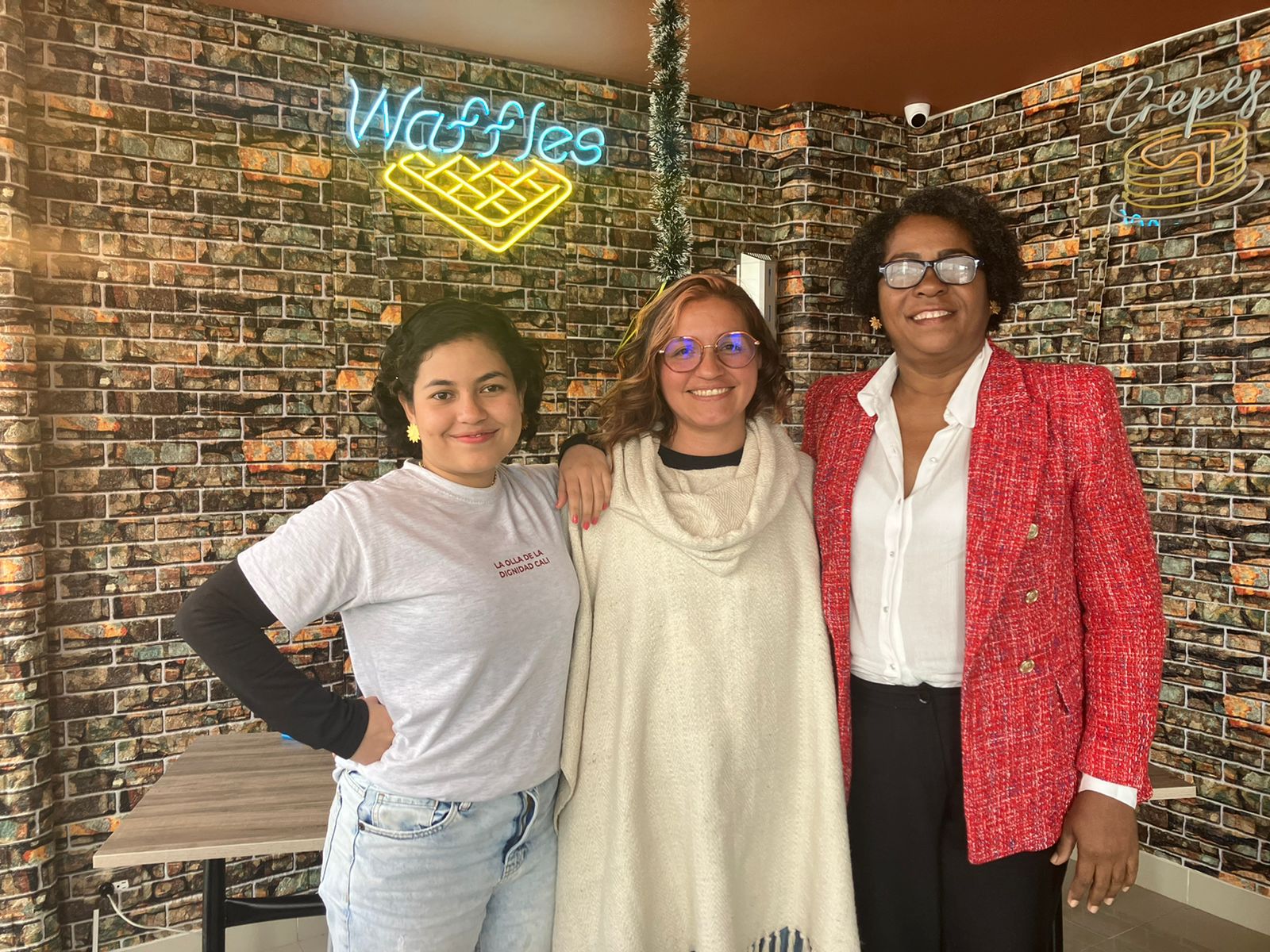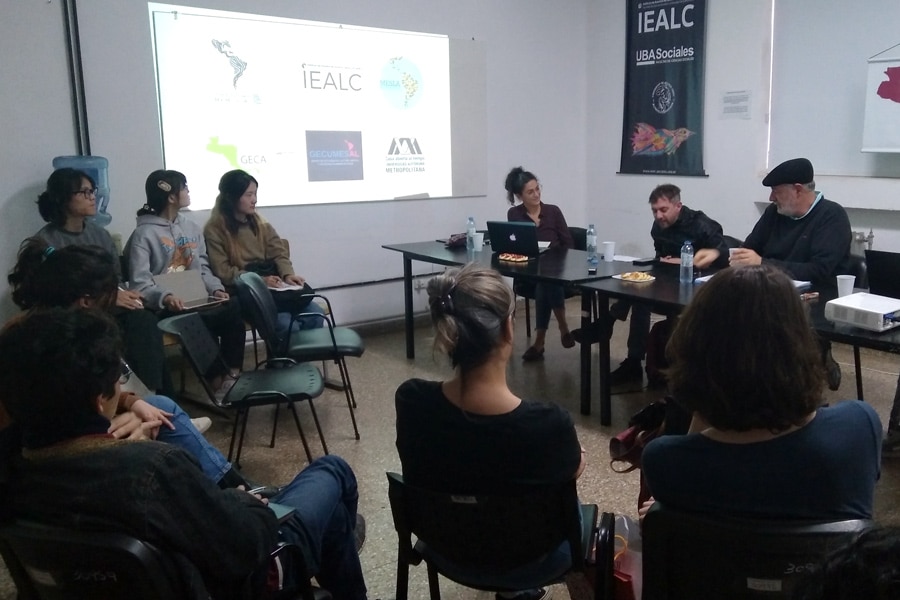Celebrating the Graduation of the 2022 Goldin Global Fellows Spanish Cohort
Creating an accessible leadership program for Spanish-speaking grassroots leaders
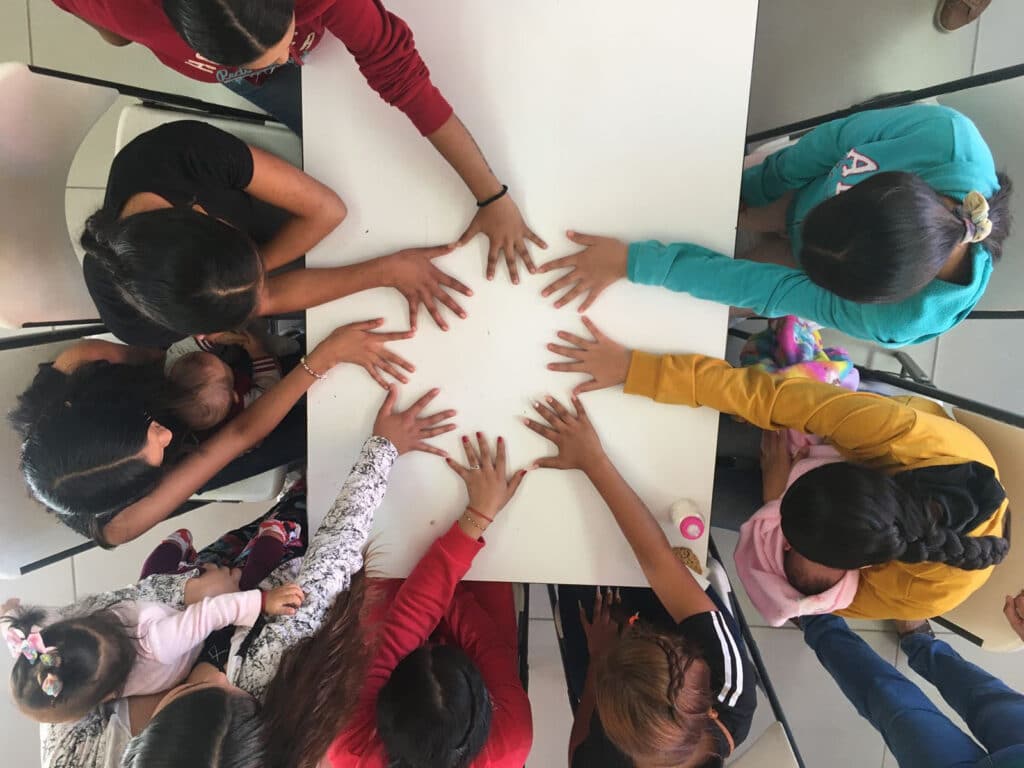
On December 10th we celebrated the graduation of the first Goldin Global Fellows program in Spanish language, where 17 Spanish-speaking grassroots leaders from eight countries in Latin America and Europe came together to create a new community of practice.
Since 2018, we've held onto the dream of offering the Fellows program in Spanish. True to Goldin Institute’s principles of ensuring that resources and connections are accessible to as many grassroots communities around the world as possible, offering the program in Spanish has long a priority for our whole team. Removing language barriers -- which included translating the curriculum, readings and videos in the GATHER Platform from English to Spanish -- was not an easy process. But I can say the effort to offer this course in Spanish has been worthwhile, especially for me as a Spanish-speaking activist who has been able to find a community who speaks in my native tongue and who are also working on both similar and different issues.
“Gather is knowledge and collective construction.” -- Luis Alomia, Colombia
During the recruitment process we counted on our Alumni, friends and colleagues from Colombia and Latin American countries to help us share the news of the application and spread the word. We were delighted to receive applications from a diverse group of grassroots leaders from over 10 countries that crossed many divides in our society, bring together youth and elders, leaders from rural places and main cities, victims of violence and former combatants. Together, these individuals represented a wide range of sectors, including environment, law, education, technology, peace and reconciliation, arts, memory, sports, theater, and more.
“Gather is a before and after of my leadership. I am happy since they contributed to broaden my vision and knowledge that will help me to build solutions that can be lasting over time and see communities as a treasure of active resources and that will be an example of good practices for other communities that want to join the transformation”. -- Natasha Duque Torres, Venezuela
It was truly a very diverse group, each doing beautiful work individually, but tied together by the common bond of being leaders on the front lines where life revolves around changing their communities and finding solutions every day. From these applicants, we selected 17 individuals who became the first Spanish-speaking cohort.
As a facilitator I was impressed when talking with our Fellows about the learnings and concepts delivered in the program, and realized how their perspectives and ideas about their community and social-change work had begun to develop and adapt. Indeed, they became more aware that new solutions had to be based on all the assets they always had but may not have seen in their communities. It was also moving to see how they started imaging a new understanding of leadership which counts on the whole community, giving opportunities to those often left behind. I was further impressed at how sensitive they became; in our conversations we sometimes cried noticing the changes they were going through and how new concepts gave them a vision of collectiveness.
"Gather has allowed me to broaden my horizons as a social leader by identifying and valuing resources and assets that we have as a community, as well as empowering the leadership of my colleagues based on the recognition of their individual strengths and interests in community work." -- Diana Rocio Gomez Torres, Argentina
Fellows felt that the course on the GATHER Platform was different from other courses because they had a strong sense of support from the Goldin Institute team and meaningful relationships with their peers.
It’s like a family that we can always count on, no matter what.
In our roundtable “Reflections and Critical Moments” one of the most broadly shared reflection was that the Fellows felt like they were not alone in this program, knowing there were other leaders around the world doing the same and learning alongside them. For example, Ernst from Haiti would tell us about the challenging times facing the Haitian population due to the political situation in his country, or Eva in Argentina would share that she faced many struggles for raising her voice against state violence. We also exchanged positive and happy stories too, for example Manuella shared about her journey from Quibdo (Colombia) to Spain to talk about how successful her project about football was there, or Nuria from México who got to be involved in a project to protect underage pregnant girls. We also had Martha from Guapi (Colombia) who graduated from her specialization during the Fellows program and Arturo from Bogota (Colombia) and his “Picaditos” Football matches with youth when they launched their book “La Prisión que Jamás me Contuvo” written by a former combatant. All of us looked forward to meeting each Saturday where we shared beautiful moments with each other during our weekly GATHER Roundtables.
“Gather is a seedbed in which the strengths, abilities and natural gifts of leaderships are brought out.” -- Geiner Arrieta, Colombia
So when the Program came to an end, Fellows wanted their graduation to be like a party; a celebration of life, cultures, learnings, our individuality and how this makes sense in community. Fellows celebrated with drinks from their territories, showing off their typical customs or any other item that represented them. We also had a freestyle performance by Johnathan, and a video of some musicians and dancers from the region where one of our youngest fellows, Luis Alomia, is from.
“My Gather experience has helped me to see that the actor of change that I want to be requires the participation of everyone in my community. Having grown up in a society where exclusion is the norm, Goldin has given me the necessary tools to be a true agent of change by collaborating with others and identifying our resources to be able to dream big together”. -- Ernst Djeride, Haiti
I have to say the best part of the celebration was the desire of Fellows to talk about the future and their optimism for new collective projects. They want to move forward, grow, and build together. Fellows Manuela and Arturo proposed four lines of work for Fellows in 2023:
-
- Creating a shared asset map with the purpose to realize a meeting of sharing vision. To have it real, we need a plan to know what we have, what can we do to meet us face to face together and develop our community visioning summit.
- Monthly meetings where each person of this cohort can lead one of the meetings.
- A directory of all the members of the Alumni network with their strengths and special topics and projects where they work.
- Participate in all the workshops set up by the Goldin Institute so we can learn, meeting new people and collaborate in new projects.
- We can share our networks, follow each other, and get to know what each one is doing, as well as and distribute what others are doing, including Goldin Institute’s social networks.
- We need help from the Goldin Institute to present our projects in case we need representation.
"Gather has given me the chance to meet my community again, open up to new listening, in order to collaborate on the paths we are charting together”. -- Nora Gabriela Fuentealba Rivas, Chile
And now, Fellows faithful to the principles they learned during the Goldin Global Fellows program wanted to remove barriers of distance so some of them made the efforts to meet with each other in person!
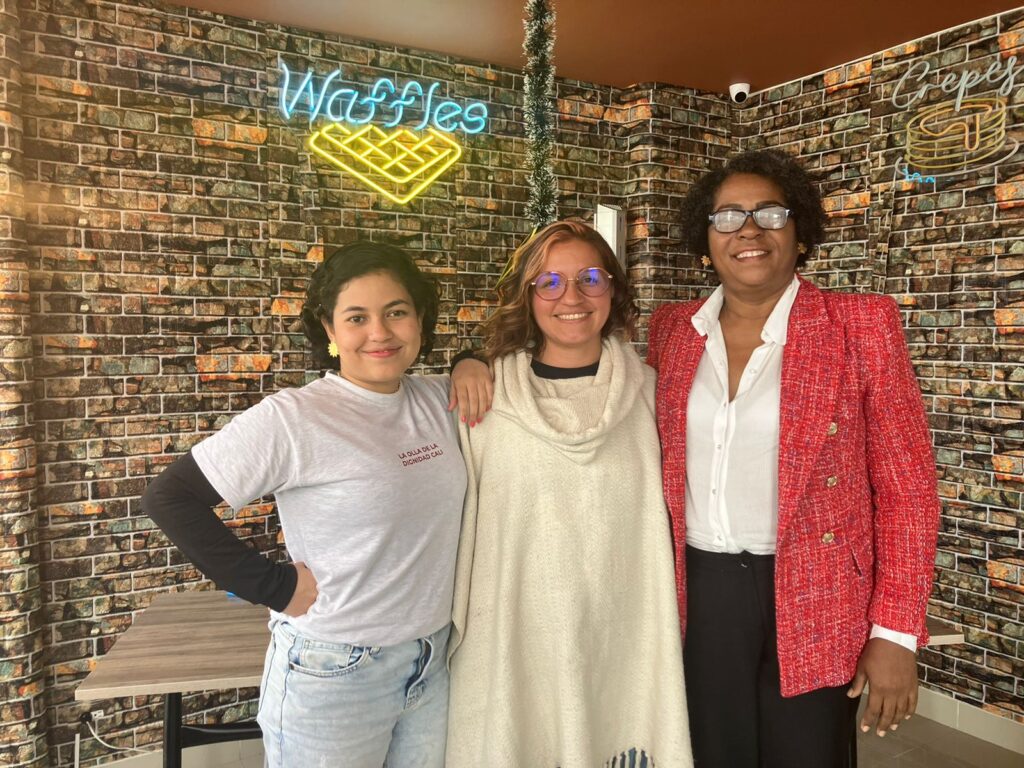
“As you may know this is the 20th birthday of Goldin Institute and I can’t think of a better way to celebrate our 20th anniversary than by welcoming you into our Global Family, congratulations to all of our new graduates on behalf of the Goldin Institute, and especially, on behalf of Diane Goldin, the Founder and Board chair of the organization.” - Travis Rejman, Executive Director of the Goldin Institute
Social Movements and State Violence
By Diana Rocio Gomez Torres, 2022 Goldin Global Fellow, Argentina
Last Thursday, August 25, we held the discussion “Social Movements and State Violence: past and present” organized by Trenzar Memorias, Memory and Culture Network in Latin America and the Caribbean. The discussion took place at the Institute for Latin American and Caribbean Studies (IEALC), attached to the University of Buenos Aires in Argentina. We set ourselves two objectives: first, to discuss the role played by the indigenous movements of the Andean region of Latin America and to evaluate the repression that the State carried out against the Guatemalan indigenous people during the 1980s. Second, to discuss the social mobilizations that have taken place in Chile and Colombia between 2019 and 2021, as well as evaluating the place of the State and its response to these mobilizations.
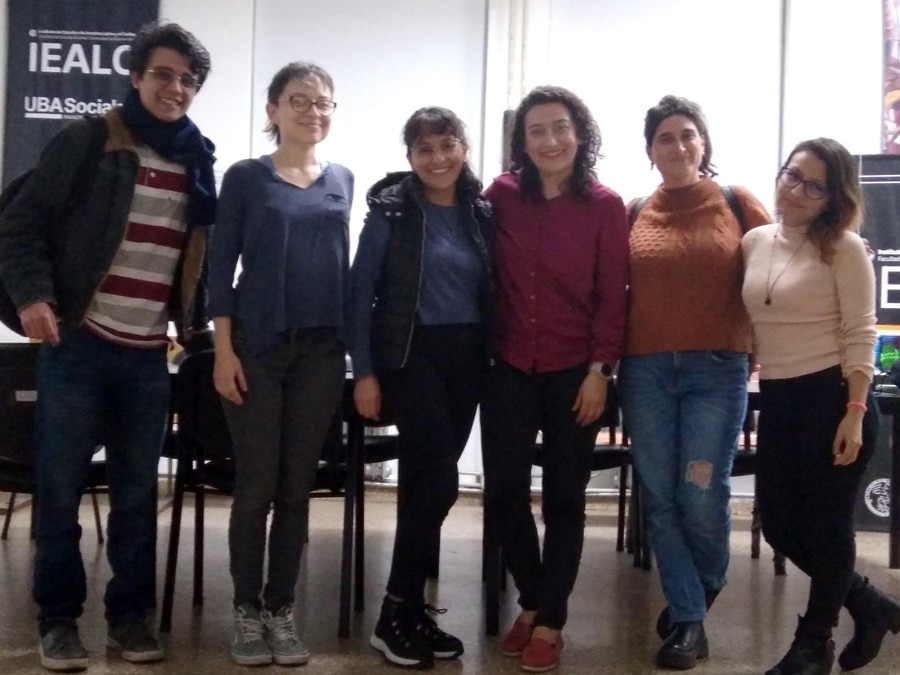
The discussion 'Social Movements and State Violence: Past and Present' is of interest to the academic community and to Latin American society in general because it allows us to reflect on the reconstruction of our recent past and find democratic solutions to the social crises of our present. -- Diana Rocio Gomez Torres, 2022 Goldin Global Fellow, Argentina
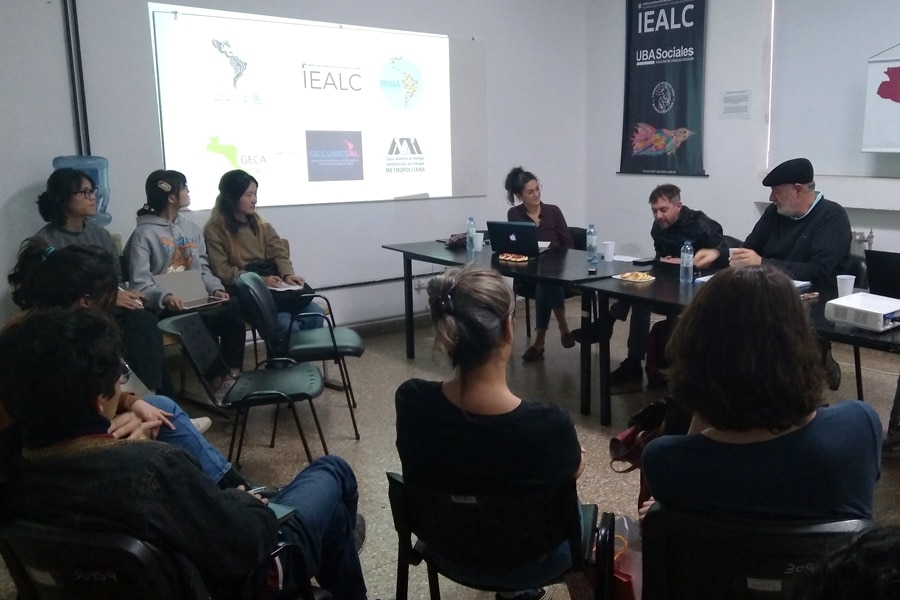
As Trenzar Memorias, we wanted to discuss the emergence of social movements in different countries of the region and the political changes that have been generated in recent years. We believe that reflection and visibility of the history and memory of these social movements are necessary, as well as the strategies of symbolic resistance that are facilitated by our cultures.
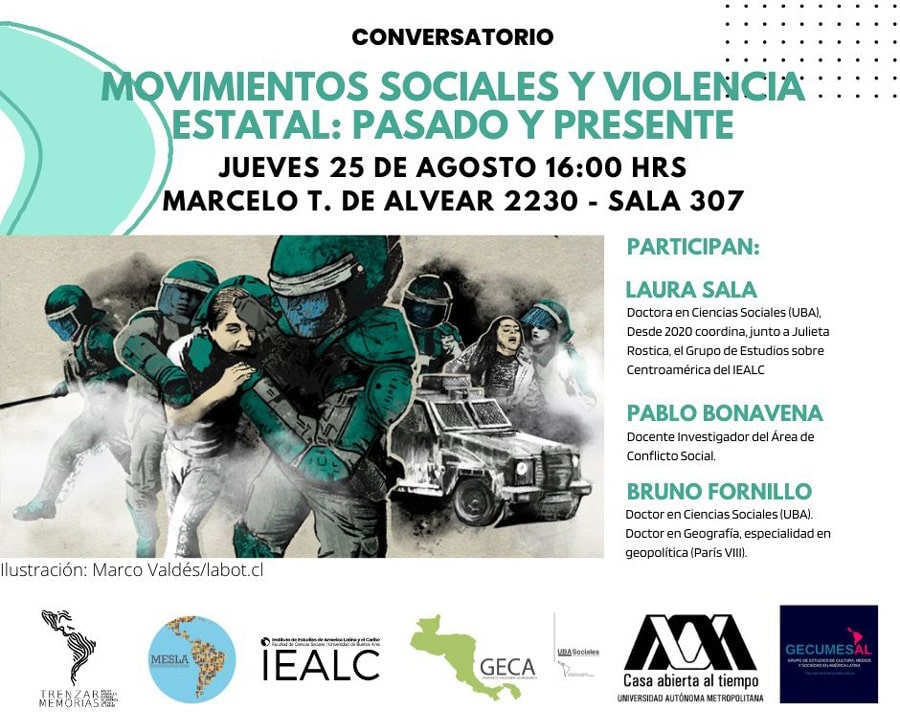
In the discussion we had the participation of three scholars who have researched the characteristics of social movements and State violence against civilian populations. Dr. Laura Sala spoke to us about the role of the State in the Guatemalan genocide. Dr. Pablo Bonavena established the relationships between the State and Social Movements throughout the history of the 20th century in Latin America. And finally, Dr. Bruno Fornillo spoke about the Indigenous movements of Ecuador, Mexico and Bolivia. and their actions during the 20th and 21st centuries.
One of the conclusions of the conversation is focused on characterizing the relations between the State and social movements, which can be understood using ‘Pacification theory’, which guides the actions of the State and also accounts for the limits of its domination when a revolt or social outburst arises. It is through this ‘pacification’ that the State builds mechanisms of domination over citizens to make social injustice tolerable. In this way, when social movements arise that claim new demands or the expansion of social or economic rights, that ‘pacification’ is called into question; and so the State's response is violent and repressive. That is to say, the emergence of social movements shows a crisis between the domination of the State and an intolerance for social injustice that until that point was allowed. Hence, the need to silence those dissenting voices of the leaders of social movements by the State, or the need to sit down and discuss the construction of a new margin of tolerance of social injustice with these actors.
To hold the event, we had the institutional support of various academic entities such as the Autonomous Metropolitan University of Mexico, the master’s degree in Social Studies in Latin America (MESLA), the Study Group on Culture and Media in Latin America (GECUMESAL), the Institute of Studies on Latin America and the Caribbean (IEALC), the Group of Studies on Central America; the latter four belonging to the University of Buenos Aires in Argentina.
The discussion is related to the dossier proposed for our third magazine Trenzar Memorias, which bears the same title "Social movements and state violence: past and present." In the following link you can find more information about the Network https://trenzarmemorias.org/
